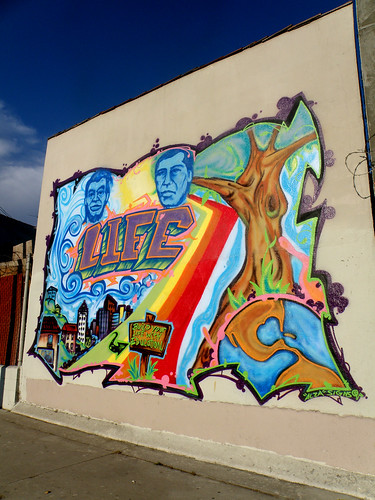EM’s List Member
Community Understanding through Theater
[This post is by EM’s List Editor/Curator, Stephanie Moore]
Cornerstone Theater
 Cornerstone Theater, a Los Angeles based theater company, collaborates with rural and urban communities to tell community stories through theater. Since its inception in 1986 the core artistic ensemble has worked side-by-side with local communities to write or adapt, direct and produce plays related to social issues. Before settling in Los Angeles in 1992 Cornerstone worked primarily in rural communities throughout the US adapting classic works to address the unique history of each place. Cornerstone still partners with theater companies in communities across the US, but their main focus is on the exploration of urban communities found in Los Angeles, CA.
Cornerstone Theater, a Los Angeles based theater company, collaborates with rural and urban communities to tell community stories through theater. Since its inception in 1986 the core artistic ensemble has worked side-by-side with local communities to write or adapt, direct and produce plays related to social issues. Before settling in Los Angeles in 1992 Cornerstone worked primarily in rural communities throughout the US adapting classic works to address the unique history of each place. Cornerstone still partners with theater companies in communities across the US, but their main focus is on the exploration of urban communities found in Los Angeles, CA.
Cornerstone’s mission focuses on building bridges both between and within communities in Los Angeles and around the US. They believe that aesthetic practice is social justice, artistic expression is civic engagement and access to a creative forum is essential to a healthy quality of life for a community. For over 25 years Cornerstone’s multi-ethnic, ensemble-based theater company has brought together high-caliber professional artists and community members to create works based on individual stories and issues from diverse communities. Community members join Cornerstone artists on stage and behind-the-scenes. These plays are then performed within a community space that might have never been thought of as a performance hall ensuring that individuals with little or no experience with theater have a chance to see their stories come alive.
In Los Angeles Cornerstone has established cycles of community residencies lasting from two to six years that address community identity and diverse social issues. Each cycle concludes with a “Bridge Show” that brings together the people and stories from all of the communities touched throughout the cycle into one play. The first cycle was based on three different ways to define community: age, geography and culture. This two-year cycle started to address how community can be defined and what it means to place yourself within a specific community. Cornerstone has since moved to a longer cycle format commissioning new plays around specific social issues: faith, justice and hunger. The current six-year Hunger Cycle is exploring our relationship to hunger from food equity to food addiction and reaching into communities of migrant workers, farmers and food justice activists among many others. The nine world premiere plays will be created through intensive residencies in diverse Los Angeles communities. This cycle also includes pre- and post-performance Creative Seeds events that are free to the public and encourage further discussion about our relationships with food and hunger.
Along with the cycles of community residencies Cornerstone also offers Institute Summer Residencies. These residencies immerse artists and institute students in a small community for one month and have them collaborate with local residents to create a community theater production. This institute is one way Cornerstone teaches its methodology for creating community-engaged theater. Through classroom and hands-on experiences institute students experience Cornerstone’s methodology first-hand and can then apply that knowledge to their future endeavors. These residencies help build and sustain the knowledge of community-engaged theater and teach new generations of artists and activists how to effectively collaborate and create.
From story circles to individual interviews Cornerstone is continually listening and giving a voice to communities in Los Angeles and around the US. Through their cycles of community residencies, Institute Summer Residencies and other projects Cornerstone is an example of the power of community-engaged theater to build connections between and within communities.
License Some rights reserved by lavocado@sbcglobal.net
